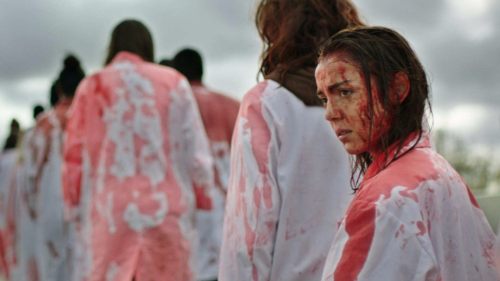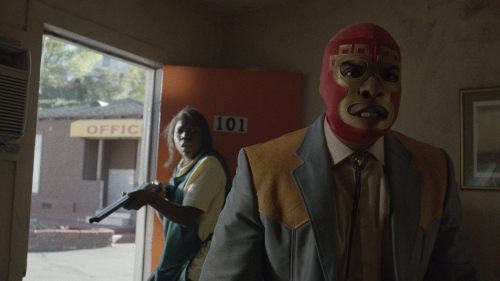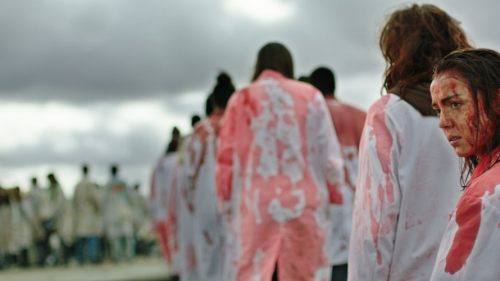Growing Pains: The Young Female Experience As Presented By WE ARE WHAT WE ARE
Raw comes out this week (get your tickets here). In celebration, we are bringing you a week of articles inspired by the film.
Being a teenage girl is tough. Considerably more so when your mother dies suddenly and you're tasked with continuing on her duties as chief murderer, dismember-er and cook for the entire family.
Before Raw came along to scare us all out of becoming vets (and sisters), Jim Mickle (Stake Land) rebooted a small Mexican horror movie about a cannibal family for a Western audience, and switched the genders of the leads to make them female instead of male.
In doing so, Mickle tells not just a twisted story of religious fundamentalists in backwoods Delaware, but of sisters bonded in an unholy alliance and struggling to understand their lives as they mature under the watchful eye of a patriarch whose hunger never seems fully satiated.
We Are What We Are takes a similar tact to the source material by only hinting at the really gruesome stuff. The word "cannibalism", spoken just once in the original, is here further downgraded to a word of text in a book. Imagery of meat throughout - a grinder, a slab of lasagne, bacon sizzling in a pan - keeps us alert but doesn't explicitly tell us anything.
Mickle's take, which he co-wrote with star and frequent collaborator Nick Damici, expands on the original's ideas and core mythology. Instead of eating people as a ritual, here it's seen as a religious rite and act of sacrifice in the service of God. In fact, far from chopping the source material to pieces, We Are What We Are reassembles its base ingredients to create a more satisfying meal.
As with the best horror movies, the gore takes a backseat. Rather, We Are What We Are's primary focus is the sisterly bond between two young women on the cusp of adulthood. Rose, the younger of the two, doesn't think it's fair that Iris is now tasked with killing people. What if they refuse, she wonders? He'll force their hands, she's gravely told.
Although Iris struggles to live up to her father's expectations, the unfortunate eldest sister resigns herself to her duties. In this family, nothing is more important. Theirs is a sad, isolated, lonely existence exacerbated by their mother's death but shared, which fosters a combined power. The usual trials and tribulations associated with being a young woman, and a teenager who feels different to her peers, are further complicated by the fact their religion denotes they must kill and eat others to survive.
Somos Lo Que Hay's featured family hid away in a shack on the outskirts of town. We Are What We Are's Parkers are right under people's noses, with a neighbour popping by to check on them every now and then. It's even hinted that the kids attend (or have attended) school. A burgeoning romance with Wyatt Russell's kindly deputy is sure to end in tears (or blood), but it tallies with the idea that these women just desperately want to be normal.
"I wish that we were like everyone else," Rose sadly tells her sister at one stage, a complaint common with teenagers who feel like outsiders (even those not grappling with the demands of religious fundamentalism). What their father considers the family's special place in the world is what these two feel holds them back from reaching their true potential, or from simply enjoying normal lives.
Lipstick is used to mark a body for dismemberment. Later, we watch as a receptionist applies the same shade in close-up. When Iris is caught in an intimate moment, after embracing someone in a desperate bid for acceptance and comfort, she is chastised for being dirty. The idea of keeping the daughters' purity intact is communicated via their strict belief system, but the implications are clear.
The styling of Julia Garner, who plays the younger Rose, is particularly pertinent. An actor usually featured with her wild, curly hair loose, as in Grandma and Martha Marcy May Marlene (with which this film shares certain DNA), We Are What We Are sees her hair in tight braids, showing how repressed she is under her father's rule. It's only later when she decides to break free from her shackles that Rose lets her hair down.
The girls' father is an abusive, domineering presence throughout, his shadow falling over Rose as she sits quietly at the kitchen table, the flick of a lighter like a cartridge being reloaded. Regardless of how he met their mother, it's clear the religion to which they're all subordinate places men in the positions of power. Only women are killed for food, and women are expected to do the murdering and subsequent preparation.
Is it indoctrination? Enslavement? Both? Mickle leaves it up to us to decide, but the sisters are clearly aware that what they're doing is wrong, regarding strangers with a mixture of inquisitiveness and distrust and being clever enough to shoo away anyone lurking on the property or asking too many questions.
Everything in their world is rain-drenched instead of sun-soaked as it was in the original movie, which lends a darker, considerably more hopeless edge to the proceedings. Mickle's palette is gloomy, so the slop, when it's eventually served up for dinner, is even more stomach-churning in comparison. Likewise, when the sisters shower the blood off together (the only real instance of the red stuff being featured).
A plaintive score further adds to the sense of melancholy, as does the movie's almost timeless sensibilities. It exists in a kind of time warp, much like the similarly moody It Follows. It's clearly set in the modern world, but the Parkers' ceremonial garb suggests they haven't shopped for new clothes in about a hundred years. The technology also seems outdated, but that could be chalked up to small town backwardness.
The (literal) growing pains inherent in this bleak, doom-laden story are most readily comparable to those of Ginger Snaps, a similarly female and teenage spin on a well-trodden horror premise with far more to say about the female experience, and growing up different, than at first seems obvious. And, in much the same way, female characters that appear submissive end up being anything but.
Horror movie tropes exist and are well-utilised in We Are What We Are, but this is essentially a coming of age story about two young women getting out from under their abusive, crazy father. Somos Lo Que Hay features, as considerably less empathic or interesting protagonists, sons. The gender flip for Mickle's remake is a choice that seems even more prescient in the current climate.
It could be reasonably argued that there's a strong, proudly feminist message to be gleaned from the sisters' eventual triumph. Indeed, the final, shocking method employed to deal with their father could be seen as the literal devouring of the patriarchy to which they've been enslaved their entire lives.



